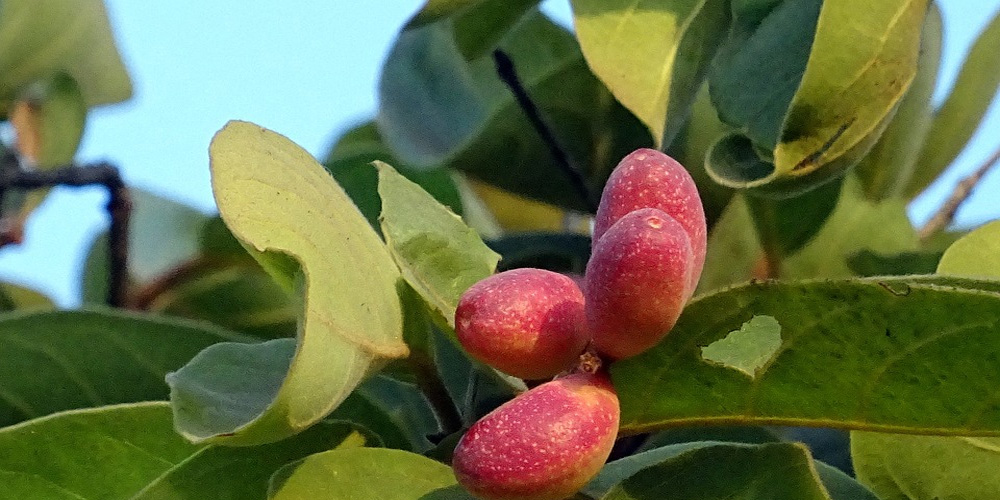What is Haritaki (Harad)?
Haritaki, also known as Terminalia chebula, is a popular herb that has been used in traditional Ayurvedic medicine for centuries. It is native to Southeast Asia and is derived from the dried fruit of the Terminalia chebula tree. Haritaki is highly regarded for its medicinal properties and is considered one of the most important herbs in Ayurvedic medicine.
In Ayurveda, Haritaki is classified as a rasayana, which means it is believed to promote longevity and overall health. It is known for its powerful rejuvenating effects on the body and mind. Haritaki is rich in antioxidants and contains several bioactive compounds that contribute to its health benefits.
Types of Haritaki
Haritaki comes in seven distinct varieties, each with unique medicinal properties, influenced by its abundant habitat, as well as its color and shape.
- Vijaya Haritaki.
- Chetaki Haritaki.
- Rohini Haritaki.
- Putna Haritaki.
- Jayanti Haritaki.
- Abhaya Haritaki.
- Amrita Haritaki.
Health Benefits of Haritaki
Haritaki offers a wide range of health benefits, making it a versatile herb in Ayurvedic medicine. Here are some of its key benefits:
- Digestive Health: Haritaki is known for its ability to improve digestion and regulate bowel movements. It has mild laxative properties that can help relieve constipation and promote healthy digestion.

2. Detoxification: Haritaki supports the body’s natural detoxification processes by eliminating toxins and waste products. It helps cleanse the colon and liver, supporting overall detoxification and improving metabolic function.
3. Sexuality and Stamina: Haritaki is identified as a natural aphrodisiac. Owing to its Rasayana properties, it promotes sexual and reproductive health in both males and females.
4. Antioxidant Activity: Haritaki is rich in antioxidants, which help protect the body against oxidative stress and damage caused by free radicals. This can have a positive impact on overall health and may help reduce the risk of chronic diseases.
5. Immune System Support: Haritaki is known for its immune-boosting properties. It helps strengthen the immune system, making the body more resistant to infections and diseases.
6. Anti-Inflammatory Effects: Haritaki has strong anti-inflammatory properties, which can help reduce inflammation in the body. This can be beneficial for various health conditions, including arthritis and inflammatory bowel disease.
7. Brain Health: Haritaki is believed to have neuroprotective effects and can support brain health. It may help improve cognitive function, memory, and concentration.

8. Diabetes management: preliminary studies suggest that haritaki may help regulate blood sugar levels and improve insulin sensitivity, making it a potential natural remedy for managing diabetes.
9. Cardiovascular health: Haritaki has been found to have cardioprotective effects. It may help reduce cholesterol levels, lower blood pressure, and prevent the development of cardiovascular diseases.
10. Cognitive function: Research indicates that haritaki may have neuroprotective properties, protecting brain cells from damage and improving cognitive function. It may be beneficial in the management of neurodegenerative disorders like Alzheimer’s disease.
11. Skin conditions: Haritaki has shown potential in the treatment of various skin conditions, including acne, eczema, and psoriasis. It may help reduce inflammation, promote wound healing, and improve overall skin health.
It is important to note that while Haritaki has been used for centuries in traditional medicine, it is always recommended to consult with a healthcare professional before incorporating it into your routine, especially if you have any underlying health conditions or are taking medications.
10 Incredible Benefits of Ginger and Watch Out for Side Effects!
Nutrition and Composition of Haritaki
Key Nutrients in Haritaki
Haritaki, scientifically known as Terminalia chebula, is a fruit that offers an array of important nutrients. This powerful fruit is widely used in traditional Ayurvedic medicine for its numerous health benefits. Here are some key nutrients found in haritaki:
- Fiber: Haritaki is packed with dietary fiber, which aids in digestion, promotes regular bowel movements, and helps maintain a healthy weight.
- Vitamin C: Known for its antioxidant properties, vitamin C helps protect the body against free radicals and boosts the immune system.
- Potassium: Haritaki is a good source of potassium, an essential mineral that plays a crucial role in maintaining proper heart function and regulating blood pressure.
- Tannins: Haritaki contains tannins, which have been studied for their potential antimicrobial, antioxidant, and anti-inflammatory properties.
Phytochemicals in Haritaki and their Health Benefits
Haritaki is rich in phytochemicals, which are compounds found in plants that contribute to their health-promoting properties. Some notable phytochemicals found in haritaki and their potential health benefits include:
- Terpenoids: Haritaki contains terpenoids, which have been studied for their antioxidant and anti-inflammatory effects. These compounds may help protect against oxidative stress and inflammation in the body.
- Ellagic Acid: Ellagic acid is a polyphenolic compound found in haritaki. It has been shown to possess antioxidant, anti-inflammatory, and anticancer properties.
- Chebulagic Acid and Chebulinic Acid: These compounds found in haritaki have been studied for their potential antimicrobial, anticancer, and hepatoprotective properties.
- Gallic Acid: Gallic acid is a phenolic compound found in haritaki that exhibits antioxidant, anti-inflammatory, and antimicrobial activities.
These phytochemicals present in haritaki contribute to its reputation as a powerful medicinal fruit. It is believed to offer various health benefits, including improved digestion, immune support, detoxification, and potential anti-cancer properties.
In conclusion, haritaki is a nutritionally dense fruit that contains essential nutrients, fiber, and a wide range of phytochemicals. Incorporating haritaki into your diet may support overall health and well-being. However, it is important to note that more research is needed to fully understand the potential benefits and dosage recommendations of haritaki.
Side effects of Haritaki
Haritaki is generally safe for most people to consume, but it can cause some side effects, especially if taken in excess. Some of the most common side effects include:
- Diarrhea: Haritaki has a laxative effect, so taking too much can cause diarrhea.
- Stomach upset: Haritaki can also cause stomach upset, such as nausea, vomiting, and gas.
- Dehydration: Haritaki can cause dehydration, so it is important to drink plenty of fluids when taking it.
- Dizziness and lightheadedness: Haritaki can lower blood sugar levels, so it can cause dizziness and lightheadedness, especially in people with diabetes.
- Interactions with medications: Haritaki can interact with certain medications, such as blood thinners and antidiabetic drugs. It is important to talk to your doctor before taking haritaki if you are taking any medications.
- Blood Sugar Regulation: Haritaki may lower blood sugar levels, which could be problematic for individuals with diabetes. Monitoring blood sugar levels is important if you’re using haritaki and have diabetes.
Haritaki is also not recommended for pregnant women, lactating mothers, or children under the age of 5.
If you experience any side effects after taking haritaki, stop taking it and talk to your doctor.
Here are some additional tips for taking haritaki safely:
- Start with a low dose and increase gradually as tolerated.
- Take haritaki with food to reduce the risk of stomach upset.
- Drink plenty of fluids to avoid dehydration.
- If you have any underlying health conditions or are taking any medications, talk to your doctor before taking haritaki.
How to Use Haritak
Haritaki, a medicinal plant commonly used in Ayurvedic medicine, is available in various forms. These include:

- Raw Fruit: The ripe fruit of Haritaki can be consumed directly. However, it is often too bitter for most people’s taste, so it is commonly taken in other forms.
- Powder: Haritaki powder is made by grinding dried Haritaki fruit. It is one of the most popular forms of internal consumption. The powder can be mixed with water, honey, or ghee to make it more palatable.
- Capsules and Tablets: Haritaki is also available in capsule or tablet form, which is convenient for those who prefer a pre-measured dosage. This form is especially useful for individuals who find the taste of Haritaki unappealing.
Recommended Dosage and Usage Guidelines
The dosage of Haritaki can vary depending on various factors, such as the individual’s age, health condition, and the form of Haritaki being used. It is always advisable to consult with a healthcare professional or an Ayurvedic practitioner before starting any herbal treatment. Here are some general guidelines:
- Haritaki Powder: The recommended dosage for Haritaki powder is usually around 3 to 6 grams per day. It is typically taken in divided doses, preferably before meals.
- Capsules and Tablets: If using Haritaki in capsule or tablet form, follow the manufacturer’s instructions regarding the dosage and frequency of intake.
- Duration of Use: Haritaki can be taken for short-term or long-term use, depending on the desired results and individual circumstances. It is important to follow the recommended duration of use to avoid any potential side effects. Regular usage over several weeks or months may yield better results.
It is worth mentioning that individual responses to Haritaki can vary, so it may be necessary to adjust the dosage or form of intake for optimal results. It is also beneficial to maintain a healthy lifestyle, including a balanced diet and regular exercise while incorporating Haritaki into your wellness routine.
Remember, before using Haritaki or any other herbal remedy, it is always wise to consult with a healthcare professional to ensure it is safe and appropriate for your specific needs.
Drug Interactions and Contraindications
Haritaki may interact with certain medications, so it’s important to heed caution and consult with a healthcare professional if you are taking any prescription drugs or supplements.
It is not recommended to take haritaki alongside medications that have a laxative effect, as it may amplify the laxative properties and lead to excessive bowel movements or diarrhea.
Additionally, haritaki should be avoided by individuals who have undergone recent surgery, as it may interfere with blood glucose control during the postoperative period.
As with any natural supplement, it’s crucial to source haritaki from reputable suppliers and follow recommended dosages. Properly storing the herb in a cool, dry place is also essential to maintaining its potency and effectiveness.
Conclusion
Overall, while haritaki is generally safe for most individuals, it is advisable to consult with a healthcare professional to ensure its suitability for your specific circumstances and to minimize the risk of adverse effects or interactions.
